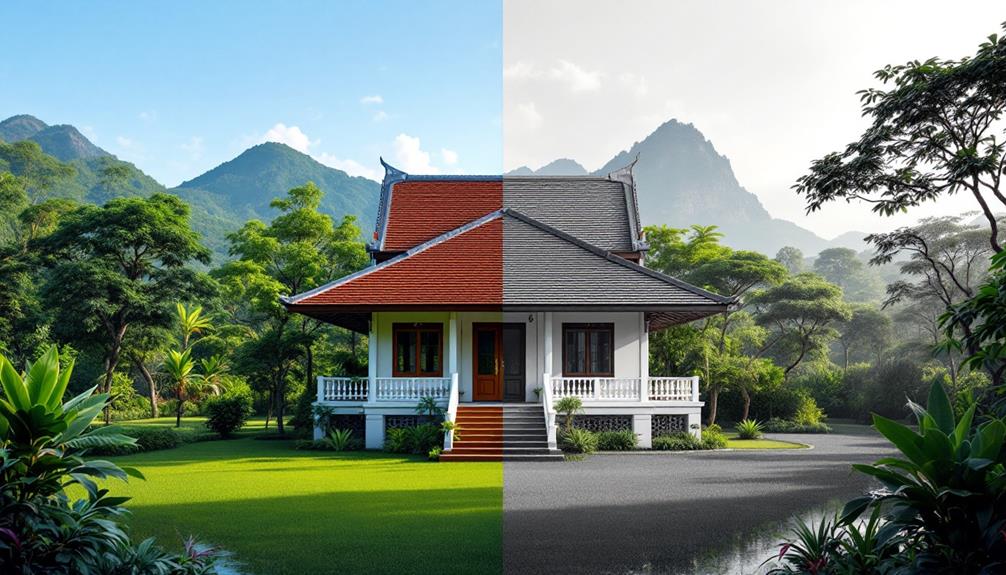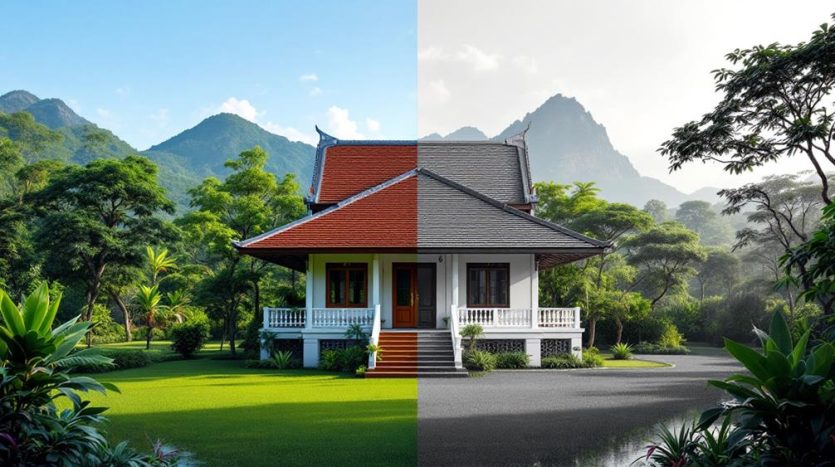Can Americans Own a House in Thailand?
Imagine the thrill of owning a piece of paradise in Thailand, a dream many Americans might think is as easy as pie. Yet, the reality is filled with twists and turns, thanks to Thai property laws that don't allow foreigners to own land directly. But don't close the door on this opportunity just yet. There are pathways like buying a condo or entering a leasehold agreement that can make this dream a reality. Curious about how you can navigate these legal intricacies and what options might suit you best? Let's explore the possibilities and find the best route for your Thai property ambitions.
Key Takeaways
- Americans can own condominiums in Thailand, but foreign ownership is capped at 49% of the total floor area.
- Direct land ownership by Americans is prohibited, but they can own structures on leased land.
- Forming a Thai company allows land ownership but requires 51% Thai national ownership.
- Long-term lease agreements, typically up to 30 years, are a common alternative for land use.
- Legal consultation is recommended to navigate complex Thai property laws and ownership structures.
Understanding Thai Property Laws

Maneuvering through Thai property laws can be complex, but understanding them is essential for anyone considering homeownership in Thailand. Think of it like trying to master a spicy green curry recipe—deliciously rewarding yet potentially hazardous if you overlook the details.
When delving into property investment, you'll first want to get a grip on the legal landscape. Thailand's property market trends are as dynamic as a tuk-tuk ride through Bangkok, so staying informed is vital. Keep in mind that foreign ownership in Thailand is subject to specific restrictions, with foreigners limited to owning 49% of the total floor area in condominium buildings. Additionally, foreigners can't own land outright, often opting for leasehold agreements instead.
First, familiarize yourself with the Land Code Act, the legal backbone of property ownership in Thailand. It's a bit like assembling IKEA furniture; it looks simple, but one wrong move, and you're sitting on a pile of confusion.
The Thai government keeps a keen eye on property transactions, ensuring legal compliance is tighter than a pair of skinny jeans after Songkran.
Moreover, market trends indicate a thriving property market, driven by increased urbanization and tourism. However, don't let the statistics dazzle you like a neon-lit Thai night market. Always perform due diligence before making any investment.
With a sprinkle of caution and a dash of humor, you'll navigate the Thai property market like a pro.
Foreign Ownership Restrictions
When maneuvering Thailand's real estate market, you're likely aware that foreign ownership restrictions can greatly impact your property ambitions.
While direct land ownership is generally off-limits to foreigners, purchasing a condominium remains a viable option, provided that foreign ownership doesn't exceed 49% of the total floor area.
For those determined to own land, exploring legal ownership structures such as setting up a Thai company or entering long-term lease agreements might offer alternative pathways within the legal framework.
It's important to understand the local rental laws and requirements for property transactions to ascertain compliance and avoid legal complications.
Land Ownership Limitations
Steering through the complex landscape of property ownership in Thailand, especially for foreigners, reveals a web of restrictions primarily centered around land ownership. You might think owning a slice of paradise is as easy as ordering pad thai, but hold your horses!
Foreigners can't own land directly in Thailand. It's like being at a buffet where you can see all the delicious dishes but can't touch them. The law strictly controls land use and ownership rights, allowing foreign individuals to possess land only under specific conditions.
Here's the scoop: you can lease land for up to 30 years, and if you're feeling particularly adventurous, you might snag a renewal option. Alternatively, you can set up a Thai-registered company, but beware of the 49% ownership cap on foreign shareholders.
Imagine owning a company, but your input is like seasoning in a soup—just a dash!
Market trends show an influx of creative strategies, such as marrying a Thai national (love or land, who can tell?), but that's a legal tightrope you mightn't want to walk.
Condominium Purchase Options
Steering through the domain of condominium purchase options in Thailand reveals a more accessible path for foreign investors compared to the labyrinth of land ownership. You can legally own a condominium outright, as long as foreigners as a whole don't own more than 49% of the total floor area of the building.
So, yes, you can sip your coconut water and admire your sea view without the complexities of Thai land laws.
When considering investment potential, think of Thailand as a tropical Wall Street. The country's surging tourism industry and urban expansion make condos a hot commodity.
Condominium amenities are often exceptional, featuring infinity pools, fitness centers, and even the occasional rooftop garden—a slice of paradise that also appreciates in value.
Legal insights reveal that Thailand's condominium laws are designed to attract foreign capital while ensuring local control. Market trends suggest rising demand in urban centers like Bangkok and resort areas such as Phuket.
In the unpredictable theater of real estate investment, Thai condos offer both comfort and opportunity.
Just remember, the early bird catches the worm—or in this case, the condo with the best amenities and views!
Legal Ownership Structures
Steering through the intricacies of legal ownership structures in Thailand reveals a landscape shaped by both opportunity and restriction for foreign investors.
If you're thinking about property investment, get ready to negotiate the unique dance of Thai property laws. So, you might want a house, but alas, Thai law can be a bit like a strict dance partner—foreigners can't outright own land.
However, fear not, there are ways to waltz around this. Foreigners can lease land for up to 30 years with options to renew, or form a Thai company to hold the land title.
Of course, forming a company requires Thai nationals to own at least 51% of it, so choose your partners wisely. And let's not forget the cultural considerations—Thailand values its land and sovereignty, so these laws aren't just red tape; they're part of the national identity.
The market trends currently show a growing interest in leasing, as it provides a balance between security and flexibility.
Just remember, while you may not own the soil under your feet, you can still build your dream home above it, with a little humor and patience.
Leasehold vs. Freehold

When considering property ownership in Thailand, understanding the distinction between leasehold and freehold is essential for making informed decisions.
Let's face it: you're not just buying a piece of paradise; you're buying into a legal conundrum that even a som tam vendor would find spicy.
Leasehold advantages can be enticing. You get a long-term lease (usually 30 years), which means you can enjoy your beachfront view without the hassle of full ownership paperwork. Plus, leasehold arrangements often come with fewer restrictions and lower upfront costs.
However, just like that mystery meat in your street pad thai, there's a catch: ownership reverts to the lessor once the lease expires. Additionally, urban areas generally have higher demand, affecting property costs.
Now, let's talk freehold disadvantages. Freehold gives you full ownership, but only if you're a Thai national. As a foreigner, you might find yourself jumping through more hoops than a circus lion.
If you somehow manage it, you'll face higher costs and stringent regulations. The market trends show a steady interest in leasehold properties among foreigners, given the flexibility and reduced commitment.
Purchasing Through a Thai Company
When considering purchasing a house in Thailand through a Thai company, you must understand the legal ownership structures available to you, ensuring compliance with local laws.
It's essential to be informed about the costs associated with urban vs. rural properties, as these can influence your investment decisions.
Pay close attention to shareholder requirements, which mandate that at least 51% of the company shares are held by Thai nationals.
Additionally, be aware of the tax implications this setup may have for foreigners, as they can greatly impact your overall investment strategy.
Legal Ownership Structure Options
Exploring the legal landscape for owning a house in Thailand often leads to the option of purchasing through a Thai company. If you're dreaming of sipping coconuts in your beachfront villa, this route could offer some enticing ownership benefits.
By forming a Thai company, you're granted the ability to own land directly, unlike individual foreign ownership, which is restricted. This means your real estate dreams don't have to be confined to a high-rise condo.
Now, let's talk investment potential. With Thailand's real estate market consistently growing, buying property through a company can be a savvy financial move. You're not just purchasing a home; you're diving into a market with promising returns.
Plus, having a local company might even open doors to other business endeavors. Who knows, maybe you'll start exporting those coconuts?
But don't get too carried away with your tropical daydreams. Setting up a Thai company comes with its own set of legal hoops and hurdles.
You'll need to navigate Thai corporate laws, and let's just say, it's not exactly a walk on the beach. So, arm yourself with a trusty lawyer and maybe a bit of patience.
Shareholder Requirements Explained
Understanding the shareholder requirements is a key step in purchasing property through a Thai company. So, you're thinking of diving into Thailand's real estate market? Great choice! But don't just cannonball in without a splash of legal savvy.
In Thailand, foreign ownership is restricted, but you can own property via a Thai company. Here's the deal: at least 51% of that company must be owned by Thai nationals. Time to get friendly with your Thai neighbors!
Let's break it down further with some key points:
- Shareholder Rights: Guarantee your rights are clearly defined. You don't want to find out you're the silent partner when the karaoke machine gets wheeled out at shareholder meetings.
- Investment Opportunities: Choose Thai shareholders with a knack for sniffing out lucrative opportunities. Your next-door neighbor might just be the next real estate mogul.
- Legal Compliance: Keep it all above board. The Thai authorities frown upon shady dealings, and you don't want your investment opportunity turning into a courtroom drama.
- Market Trends: Stay informed. A little knowledge about Thai property trends could have you laughing all the way to the tuk-tuk bank.
Navigating these waters will arm you with the clarity needed to make sound investment decisions.
Tax Implications for Foreigners
In the domain of Thai real estate investment, recognizing the tax implications is essential when purchasing property through a Thai company.
First, let's talk tax residency. You're not exactly moving in with your new Thai property, but if you spend more than 180 days a year in Thailand, they might consider you a tax resident. And yes, that's not just for the heat and beaches—it involves income tax too.
Now, withholding taxes might sound like something you'd do with a bad haircut, but here it involves a 15% slice on dividends.
Capital gains? They're treated as ordinary income, so brace yourself for tax rates that could make your head spin faster than a tuk-tuk ride.
Good news though—tax treaties between Thailand and the U.S. might just save your day, ensuring you're not taxed twice.
While property taxes are relatively low, don't forget about the inheritance tax, which could come into play if you plan to pass the property down.
And yes, tax deductions are possible, but maneuvering them requires the expertise of a Thai tax wizard (or a good accountant).
Now, go ahead, invest wisely, and may your tax adventures be as thrilling as the investment itself!
Condominium Ownership Rules

Maneuvering the intricacies of condominium ownership in Thailand requires understanding a set of specific rules designed to regulate foreign ownership.
First off, don't get too excited about owning a penthouse overlooking Bangkok unless you know the 49% rule. Only 49% of the total floor area in any condominium can be foreign-owned. That keeps you on your toes, doesn't it?
When it comes to condominium management, you've got to be aware of how these operations work. The common area is like the communal living room for owners, so you'll be sharing that space with others, even if your karaoke skills are exceptional.
Here's a quick guide to navigate these waters:
- Check the 49% Foreign Ownership Cap: Before you sign anything, make sure you're within the allowed percentage of foreign ownership.
- Understand the Condominium Juristic Person: This is the legal entity that manages the building and common areas. They've got more power than a sitcom landlord.
- Monthly Fees: Be ready to pay your share for maintaining those common areas, even if you never use the pool.
- Market Trends: Stay informed about the property market to avoid any surprises—because nobody likes surprises, except maybe birthday ones.
Legal Requirements for Foreigners
When you're considering owning a house in Thailand as a foreigner, it's essential to understand the legal landscape surrounding property ownership.
Thai law imposes restrictions on foreign ownership of land, prompting many to explore legal property structures, such as leasehold agreements or setting up a Thai company, to facilitate their investment.
Keeping up with market trends and legal developments can help you navigate these complexities and make informed decisions.
Foreign Ownership Restrictions
Maneuvering the intricate web of foreign ownership restrictions in Thailand is essential for any non-Thai national considering property investment.
Before you dream of sipping coconut water on your Thai porch, let's explore a few legal quirks. First, you can't own land directly in Thailand. But don't worry, there's more! You can own a condo, as long as foreign ownership in the building doesn't exceed 49%.
Let's face it, that math beats deciphering those IKEA assembly instructions.
Here's a quick guide to help you navigate:
- Land Ownership: Sorry, you can't directly own land. But you can lease it for up to 30 years with an option to renew.
- Condominium Ownership: You can own a condo, but foreign ownership in any building mustn't exceed 49%.
- Capital Requirement: If you're keen on property investment, having a valid foreign residency or work permit helps, but you'll need to bring in money from abroad.
- Legal Entities: While you can't own land personally, you might consider forming a Thai company. But be wary of the legal gymnastics involved!
Legal Property Structures
Understanding the legal property structures available to foreigners in Thailand is essential for maneuvering its real estate market effectively.
Let's dive right in: foreign ownership of land is as rare as a unicorn in this tropical paradise. However, you can legally own condos, as long as foreigners collectively hold less than 49% of the building. So, if you love sharing, this might be your best bet.
For those with dreams of owning a house, consider a long-term lease. You can lease land for up to 30 years, with options to renew. It's like putting down roots without actually owning the soil.
But remember, leasehold agreements require some cultural considerations, given the Thai penchant for face-saving and harmony. A little tact goes a long way!
If property investment is your game, forming a Thai limited company is another option. You'd technically have control, but remember, Thais must own at least 51% of the company shares.
Think of it as a team-building exercise with legal implications. Just make sure you're on the right side of the law to avoid any unexpected plot twists in your tropical adventure.
Financing Property Purchases

How does one effectively navigate the complex landscape of financing property purchases in Thailand?
You've traveled halfway around the world, hoping to find your dream home, only to discover the financing maze isn't exactly a walk on the beach.
Here's how to make sense of it all:
1. Mortgage Options: Believe it or not, Thai banks aren't enthusiastic to lend to foreigners.
But don't despair! Some banks offer special programs for expats.
Just remember, your interest rate might be higher than your cholesterol after a holiday feast.
2. Financing Sources: You've got options beyond traditional banks.
Consider international banks with Thai branches or even property developers offering financing plans.
They're like the fairy godparents of real estate, minus the magic wand.
3. Legal Insights: Familiarize yourself with Thailand's legal requirements.
You don't want to be blindsided by a law that'll have you questioning if you've accidentally signed up for a game of property Jenga.
4. Market Trends: Keep an eye on the real estate market.
Prices fluctuate more than a seesaw in a playground, so timing is everything.
Equip yourself with knowledge, and soon you'll be sipping a coconut in your new Thai abode!
Navigating the Property Market
Diving into the Thai property market requires a keen understanding of local dynamics and a strategic approach. Imagine the Thai property market as a bustling bazaar where you need to haggle with charm and grace.
With property market trends swaying like a tuk-tuk in traffic, you must keep your wits about you. The good news? Thailand's market offers investment opportunities that could make your wallet do the happy dance. But beware, you'll need to navigate legal intricacies like a pro.
First, familiarize yourself with the Condominium Act, which sounds like a snooze-fest but is actually your best friend. Foreigners can own condos, but only if you're not surpassing the 49% foreign ownership quota. Think of it like finding a needle in a haystack, but with more potential for beachfront views.
Next, keep an eye on property market trends. They're like the weather in Bangkok—sometimes predictable, often not. Areas like Bangkok and Phuket are hot spots, but emerging markets in Chiang Mai and Pattaya might just be the underdogs you're looking for.
Working With Real Estate Agents

Maneuvering the complexities of working with real estate agents in Thailand can feel like unraveling an enchanting mystery. The real estate market here is as vibrant as a Bangkok night market, and finding agents who know their stuff is essential. You're not just looking for a good deal; you're entering a labyrinth of legalities and cultural nuances.
Here's how to navigate this tricky terrain:
- Do Your Homework: Research the real estate market like a detective on a mission. Know the lay of the land, price trends, and hot neighborhoods. This isn't just about finding agents; it's about finding the right agent.
- Verify Credentials: Not all agents are created equal. Check for licenses and experience to avoid turning your investment into a sitcom punchline.
- Communicate Clearly: Miscommunication can happen faster than a tuk-tuk ride. Make certain your agent understands your needs, budget, and timeline.
- Understand the Legal Side: Thai property laws can be as twisty as a bowl of pad thai. Enlist an agent who's got a solid grasp of the legal landscape, saving you from any unwanted spicy surprises.
With these tips, you'll be one step closer to calling Thailand home, minus the drama.
Tips for Prospective Buyers
When you're ready to commence on the journey of purchasing a home in Thailand, it's crucial to arm yourself with a solid understanding of the local market dynamics and legal frameworks.
It's not just about finding a dreamy villa with a hammock by the sea; you need to navigate the Thai legal maze, which, let's face it, could be a plot twist in a thriller.
Start by understanding that foreigners can't own land outright—cue the dramatic gasp—but fear not! You can own the structure on the land. Think of it as buying a house but renting the lawn.
As you wade through home buying, remember the cultural considerations. Thai people value relationships, so don't rush negotiations. Instead, channel your inner Zen master and embrace the art of patience.
Keep an eye on market trends, too. The Thai real estate market can be as unpredictable as a cat on a hot tin roof, but with the right intel, you'll spot opportunities.
Lastly, consult a local lawyer who knows the ropes. They're your legal GPS through Thailand's property jungle, ensuring you don't end up owning a "house of cards."
Safe travels, intrepid buyer!









